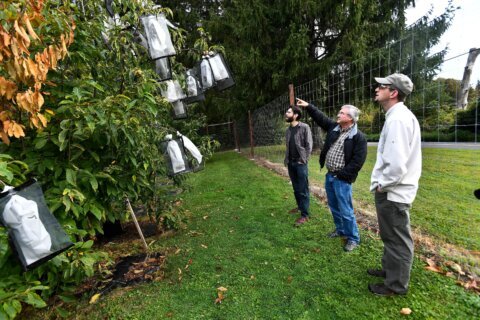FRANK JORDANS
Associated Press
BERLIN (AP) — A party that wants to ditch the euro currency in its current form was elected to one of Germany’s state assemblies for the first time Sunday.
Preliminary results showed the party, Alternative for Germany, receiving 10 percent of the vote in elections for the Saxony state parliament. This would be enough for it to clear the 5-percent hurdle needed to enter parliament.
The ruling Christian Democratic Union of Chancellor Angela Merkel received more than 39 percent of the vote, but their current coalition partner the Free Democratic Party was predicted to lose all its seats in Saxony, the last of Germany’s 16 states where it was still in government.
The Left party came second, with up to 19 percent, followed by the Social Democrats with about 12.3 percent. The Greens received about 5.5 percent of the vote, while the far-right National Democratic Party was on the cusp of re-election with 5 percent. An official result was expected later Sunday.
Alternative for Germany narrowly missed entering the national parliament and the Hesse state assembly last year, but won seven seats in the European Parliament this May.
The party, known by its German acronym AfD, has shaken up German politics since it was founded only last year. Led by an economics professor, Bernd Lucke, AfD has drawn supporters from all other parties but chiefly the Free Democrats.
Their disappearance at last year’s general election pushed Merkel into a “grand coalition” with the Social Democrats at the national level, an option now also being mooted for Saxony.
Some in Merkel’s party have suggested it should be open to a coalition with AfD, though the chancellor has spoken out against this.
Lucke told reporters in Berlin that he wouldn’t rule out any possible coalition.
But he reiterated his party’s line that the euro needs to be drastically reformed — a position no mainstream party in Germany advocates.
“We need to correct our course and change the euro,” Lucke told The Associated Press. “We need to have a smaller currency group or leave the euro and reintroduce the Deutschmark.”
Experts say AfD benefited from protest votes in a state that has been ruled by the Christian Democrats since German reunification in 1990. Fewer than half of Saxony’s 3.5 million voters turned out to cast ballots Sunday.
AfD could enter two more state parliaments in a fortnight, when the eastern states of Thuringia and Brandenburg hold elections.
Copyright 2014 The Associated Press. All rights reserved. This material may not be published, broadcast, rewritten or redistributed.







